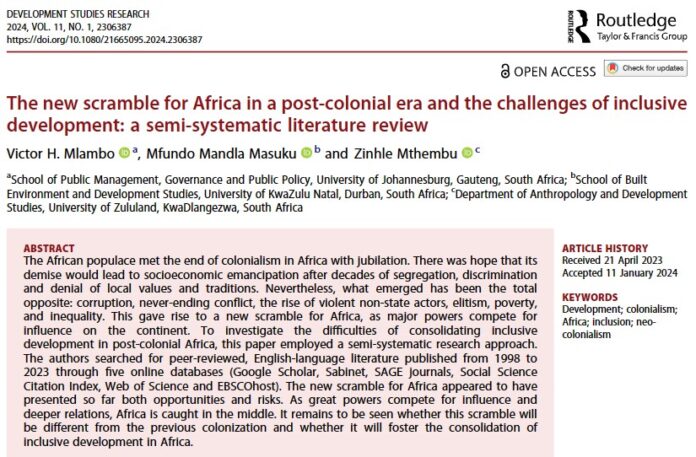April 2024: Paper of the Month by Mlambo, et al., 2024 – The New Scramble for Africa in a post-colonial Era and the Challenges of Inclusive Development: A Semi-systematic Literature Review
A recent article by Mlambo, et al., (2024) titled “The New Scramble for Africa in a post-colonial Era and the Challenges of Inclusive Development: A Semi-systematic Literature Review” published in Development Studies Research shows that post-colonial Africa faces issues such as corruption, conflict, elitism, poverty, and inequality, which hinder inclusive development.
The Scramble for Africa is often associated with the late 19th century and early 20th century, when European powers divided the African continent among themselves. However, the modern era is witnessing a new kind of scramble, characterized by a competitive race among major global powers for economic and political influence in Africa. This contemporary scramble involves a diverse range of actors, including China, the United States, the European Union, Russia, and others, each seeking to expand their presence and secure strategic interests in the continent. This renewed competition has raised important questions about its impact on Africa’s socioeconomic development and the extent to which it fosters or hinders inclusive growth.
“
Post-colonial Africa faces corruption, conflict, elitism, poverty, and inequality, while major global powers’ competition offers both risks and opportunities. -Mlambo, et al., (2024)
Inclusive Development
A central theme in the discussion is the concept of inclusive development. Unlike traditional growth models that focus on gross domestic product (GDP) and other macroeconomic indicators, inclusive development emphasizes equity, social justice, and broad-based prosperity. It seeks to ensure that the benefits of economic growth are shared widely across society, avoiding the pitfalls of exclusionary growth that concentrates wealth among a select few and leaves behind significant portions of the population. Inclusive development also addresses the need for fair labor markets, equitable access to education, healthcare, and other social services, and sustainable practices that support long-term growth. The study examines the challenges African countries face as they navigate this new scramble. Key concerns include the risk of exploitation, the undermining of local governance, and the erosion of sovereignty as external powers vie for control. There is also the danger that this competition will replicate the power imbalances of the colonial era, leading to uneven development and marginalization.
However, the new scramble also presents opportunities for African nations to leverage external interest for their own benefit. If approached strategically, partnerships with global powers could result in technology transfer, infrastructure development, and increased investment, all of which could contribute to more inclusive development. The study questions whether these opportunities will be realized or if history will repeat itself, with wealth and power becoming concentrated in the hands of a few, while broader segments of the population remain excluded from the benefits of economic growth.
How the Study was Conducted
The authors adopted a semi-systematic review, a narrative review approach that partially follows systematic review guidelines in literature survey and selection. The authors conducted searches across five online databases, including Google Scholar, Sabinet, SAGE journals, Social Science Citation Index, and EBSCOhost, between November 2022 and April 2023. The search terms used were ‘inclusive development’ AND ‘Africa’ AND ‘colonialism’ OR ‘post-colonialism’ OR ‘neo-colonialism’, directly related to the research question. The authors initialized 1,872 articles and reduced them to 811 after removing duplicates and irrelevant studies. Following a rigorous review process, only 89 articles were selected for analysis.
What the Authors Found
The authors found that post-colonial Africa faces issues such as corruption, conflict, elitism, poverty, and inequality, which hinder inclusive development, and also major powers are competing for influence on the continent, presenting both opportunities and risks for Africa’s development.
Why is this Important
Historical Context: Understanding the historical context of colonization and its aftermath in Africa is crucial. The legacy of colonialism has shaped the continent’s political, economic, and social landscape, and recognizing this context informs current development efforts.
Inclusive Development: The concept of inclusive development emphasizes that economic growth should benefit all segments of society, rather than a privileged few. By examining challenges to inclusive development in Africa, policymakers and researchers can identify strategies to promote equitable progress.
Ethical Implications: The scramble for Africa during colonial times was marked by exploitation, resource extraction, and human rights abuses. The new scramble, driven by major powers, raises ethical questions about sovereignty, fair trade, and sustainable development.
Global Power Dynamics: The competition among major powers for influence in Africa reflects broader geopolitical dynamics. Understanding these power struggles helps policymakers navigate diplomatic relations and economic partnerships.
Policy Formulation: Insights from this study can inform policy decisions related to foreign aid, investment, and development assistance. Policymakers can learn from historical mistakes and design more effective strategies for inclusive growth.
What the Authors Recommend
- The authors recommend that policymakers should prioritize inclusive development policies that address poverty, inequality, and social exclusion. These policies should focus on improving living standards for all citizens, regardless of socioeconomic background.
- Given the historical context of colonization and exploitation, ethical considerations are crucial. The authors recommend fair trade practices, responsible investment, and respect for national sovereignty in international relations.
- The authors emphasize that African nations should collaborate with major powers and international organizations to leverage resources effectively. Strategic partnerships can facilitate sustainable development and address common challenges.
In conclusion, the new scramble for Africa presents a complex mix of challenges and opportunities that require careful navigation. While major global powers vie for influence, African nations must prioritize inclusive development to ensure that economic growth benefits all segments of society. Ethical considerations, such as fair trade and respect for national sovereignty, are paramount in shaping a more equitable and sustainable future. By embracing strategic partnerships and learning from past mistakes, African countries can turn this new scramble into a catalyst for positive change, fostering a landscape where prosperity is widely shared and power imbalances are addressed. Ultimately, the path toward inclusive development requires a collaborative effort that honors Africa’s history while embracing innovative approaches for its future.

















 The African Research (AR) Index is a comprehensive scholarly directory and database focused explicitly on journal publishers that publish and disseminate African research.
The African Research (AR) Index is a comprehensive scholarly directory and database focused explicitly on journal publishers that publish and disseminate African research.

